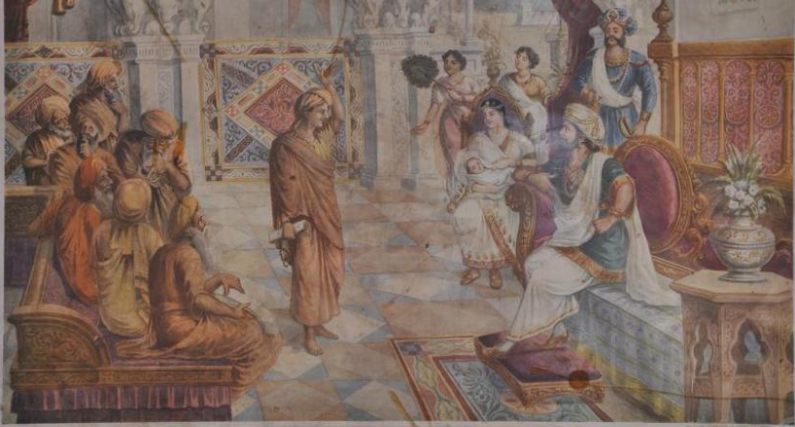The common word for king is राजा (rājā) in Sanskrit, βασιλευς (basileus) in ancient Greek and cyning in Old English. But in poetic diction these languages also all share a number of very similar circumlocutions, i.e. descriptive terms or so called speaking words, that can stand for the common noun, by describing character traits, with which a king should be endowed or functions, which he is expected to fulfil.
Sanskrit has a number of compounds ending in पः (paḥ), which element is derived from the root पा (pā), meaning to protect. The short form पः (paḥ), which can only be used as second element of compounds, is a kind of noun made by adding case endings directly to the root. When formed from the root for protect, this short form adds the meaning protector to a compound in which it features. Due to the function of a king as protector, a number of speaking words for king are made using this element. He can be a भूमिपः (bhūmipaḥ), a protector of the भूमिः (bhūmiḥ), the land, or also a नृपः (nṛpaḥ), a protector of नृ (nṛ), of man, i.e. of the people.
The Homeric dialect of ancient Greek has a very similar circumlocution for king: ποιμήν λαῶν (poimēn laōn), the shepherd of the people.
It is striking that the Greek phrase, found time and again in the Iliad and the Odyssey, turns up almost verbatim, a millennia and a half later and thousands of miles away from the rosemary scented Mediterranean, in the Old English poetic dialect, where a king can be called folces hyrde, the herder of the folk. While Greek is more or less limited to the above phrase, Old English has a wide range of synonymous and nearly synonymous circumlocutions for king. He can be eorla helm, the protector, lit. the one who covers (the source of both the word helmet and hell), the earls, i.e. his subjects. Or, representing the same idea about the function of the king as Sanskrit भूमिपः (bhūmipaḥ), he can also be described by the word eþelweard, the warden of the land. Finally, there is a range of expressions relating to the duty of the Germanic king or war-band leader to bestow gifts of worthy followers: goldwine gumena, the gold-friend of men, and hringa fengel, the lord of rings.
Silvio Zinsstag,
teacher for ancient languages



I saw a remarkable video on youtube entitled “Reciting Homer – Ilias book VI”, which is the recitation of the VI book with a recostructed pronounciation of ancient greek accent and prosody. I would ask you if it’s the first time that such a similar reconstruction was made or if there are some other experiments before. Thank you. Michele.
Thanks for the suggestion, I was looking for a brand name that starts with a Sanskrit work.